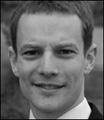
Submitted by Administrator on Fri, 05/10/2012 - 10:24
Prestigious grant awarded to Dr Jon Simons
The James S. McDonnell Foundation (JSMF) has awarded a 21st Century Science Initiative Grant on Understanding Human Cognition, worth $600,000 over 6 years, to Dr Jon Simons (pictured), leader of the Memory Laboratory and a Senior Lecturer in the Department. The title of the grant is: Getting a Grip on the Subjective Experience of Remembering.
The JSMF was established in 1950 by James S. McDonnell with its aim being to "improve the quality of life". JSMF Scholar Awards in the program area Understanding Human Cognition support research which investigates how neural systems are connected to and support cognitive functions, and the relationship between cognitive systems and observable behaviour.
Getting a Grip on the Subjective Experience of Remembering
The ability to remember personally experienced events in vivid, multisensory detail makes an immensely important contribution to everyday life, allowing us to re-live each moment of a previous encounter and providing us with the store of precious memories that form the building blocks of who we are. Such recollection is considered to involve reactivating sensory and perceptual details of an event, and the thoughts and feelings we had at the time, and integrating them into a conscious representation during retrieval. It makes possible a number of critical decision making abilities, such as distinguishing real experiences from those we might have imagined or been told about. However, although scientists have discovered a great deal about the cognitive and neural processes that enable us to recall a word list or discriminate studied from novel words, considerably less is known about the processes underlying the subjective phenomenological experience of remembering. The aim of my research programme is to develop a detailed neurocognitive characterization of subjective memory, to better understand the way it may be impaired in health and disease, and to develop rehabilitation strategies to help those who may have reduced ability to re-experience the past.
Subjective experiences associated with memory retrieval are complex and difficult to disentangle. The thrust of my theoretical and experimental work has been to attempt to understand them in terms of their constituent cognitive processes and to explore the extent to which predicted dissociations emerging from psychological theorizing are observed at the behavioural and neural levels. My work uses a variety of approaches (behavioural, neuroimaging, electrophysiology, clinical studies, brain stimulation, cognitive remediation) in complementary and creative ways to scrutinize and dissect the cognitive processes that give rise to the multifaceted properties of subjective experience. In pursuing this, I have begun to identify dissociable cognitive and neural responses associated with aspects of subjective memory across regions of prefrontal, medial temporal, and parietal cortices. I have shown that these separable patterns of structure and function can be directly related both to inter-subject variability in the general population and to clinical conditions in which the processes appear to be disturbed.
My research programme will take this work forward using a combination of neuroimaging and electrophysiological methods to investigate the performance of healthy volunteers on memory tasks that emphasize a number of aspects of subjective remembering. I will examine the effect on neurocognitive retrieval measures of organic lesions in neuropsychological patients and temporary "lesions" in healthy volunteers induced using transcranial magnetic stimulation, as well as of naturally occurring variability in cortical folding patterns. The results from these different techniques will enable me to develop a comprehensive theory that explains the contribution of cognitive mechanisms subserved by frontal, medial temporal, and parietal regions to subjective memory. I will then seek to apply this knowledge to develop memory-related cognitive training techniques and rehabilitation therapies that could produce potentially long-lasting enhancement of the subjective experience of remembering in both patients and healthy individuals.
